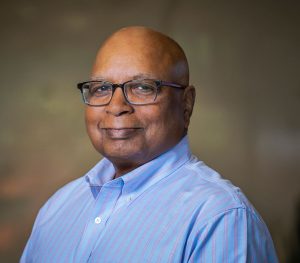Ashok Krishnamurthy is the director of the Renaissance Computing Institute (RENCI) and co-director for informatics and data science at NC TraCS.
 Ashok Krishnamurthy was named director of RENCI in March 2023 and previously served as RENCI’s deputy director. For the last decade, he has served in leadership roles within the institute and as an expert in informatics and data science, including data science cyberinfrastructure, medical image analysis, time-series data analysis, machine learning, and high-performance computing.
Ashok Krishnamurthy was named director of RENCI in March 2023 and previously served as RENCI’s deputy director. For the last decade, he has served in leadership roles within the institute and as an expert in informatics and data science, including data science cyberinfrastructure, medical image analysis, time-series data analysis, machine learning, and high-performance computing.
UNC Research spoke to Krishnamurthy about his career and the latest happenings at RENCI.
How did you begin your career in computer and data science?
In my graduate school days, I was training in an area called digital signal processing — using computers to analyze and synthesize digitized signals such as speech, audio, radar, and images. The field of data science has flourished as an increasing amount of human activity has been converted to digital, computable artifacts. I have followed this evolution and started applying my methods and computing skills to a much wider set of data types.
Since I joined RENCI 10 years ago, I have focused on biomedical data — electronic health records, biomedical images from microscopy, CT scans, and echocardiograms — in my own research. My association with the NC TraCS Institute and its fantastic team has helped me greatly with this work.
What excites you about the future of this technology?
The growth of data is continuing at an exponential pace. At the same time, computing technologies such as graphics processing units and cloud computing are enabling us to process larger and larger amounts of data. We are seeing the results of this growth in AI products like ChatGPT. In less than four months since they were released, large language models such as GPT4 have caught our imagination and hold the promise of fundamentally altering knowledge work from medicine to journalism to software coding.
The potential is huge, but it comes with many social and ethical concerns. Over the next few decades, we will have to figure out how to use these powerful technologies to advance human society — exciting work that needs researchers across many disciplines to come together to collaborate with and learn from each other.
How is RENCI positioned to navigate disruptions in the industry?
RENCI is, at its center, a translational technology institute and a team science leader. We excel at developing and deploying cutting-edge data science, computing, and networking solutions that advance research. We take on these tasks collaboratively with researchers and experts in several disciplinary areas, with a current focus on the biomedical, environmental, and social sciences.
We have found great success in managing large projects, bringing together diverse teams, and engaging with researchers and users to advance research. Additionally, we are incredibly agile and quickly adapt to changes in requirements and technologies. In many ways, we are well-positioned to help Carolina researchers understand and take advantage of the large disruptions being created by data science and AI.
How will RENCI collaborate with the School of Data Science and Society?
The School of Data Science and Society (SDSS) is the academic home for data science on campus and RENCI is a leading data science research institute. The two are working together to create a symbiotic relationship. SDSS and RENCI intend to help expand and nurture the data science field at UNC-Chapel Hill by supporting data science teaching and research across campus on a larger scale.
I serve as a member of the SDSS Research Advisory Council, which provides guidance in areas such as strategic research issues and core facilities. Additionally, RENCI is providing operational support to SDSS as they ramp up their own operations, and we plan to provide infrastructure to support the school’s courses and research projects. As new faculty join SDSS, we hope that many will be able to work with RENCI staff to develop joint proposals and projects.